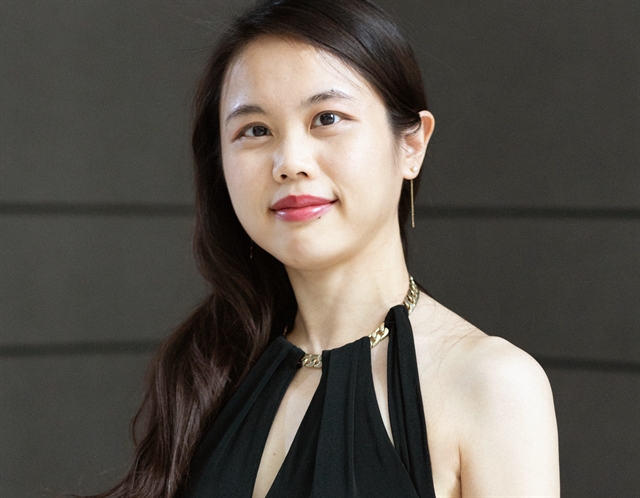 Life & Style
Life & Style

 |
| Pianist Liao Hsin Chiao. — Photo courtesy of the artist |
Pianist Liao Hsin-Chiao performed Piano Concerto Bất Khuất with the Việt Nam National Symphony Orchestra (VNSO) recently, honouring the piece by the late composer Đỗ Dũng.
The Taiwanese-born pianist holds a doctoral degree from Stony Brook University in New York and has performed in several well-known venues in the US such as Symphony Space and Harvard Club in New York and the Steve and Judy Turner Recital Hall in Tennessee.
She has been living and working in Việt Nam since 2021.
Việt Nam News reporter Nguyễn Bình spoke with the pianist about her career.
At your recent Piano Concerto Bất Khuất by late composer Đỗ Dũng at Việt Nam Academy of Music’s great hall, the audience went wild. How satisfied were you with your performance?
I am humbled to know that the audience enjoyed and resonated with the Piano Concerto Bất Khuất.
As the pianist, I gave my very best to the composition and the performance and enjoyed many touching moments in the music on stage together with all the musicians from the VNSO and maestro Honna Tetsuji.
Of course, in terms of performances, all musicians know that we will always feel that there’s room to do better the next time, but I was happy and grateful that I had the chance to share the music with all the music lovers who came to support us, musicians, and the Vietnamese classical music that night.
It is a great loss that our composer Đỗ Dũng couldn’t be in the audience himself with all of us, but I hope our work has done the composition justice and hope the concerto will get to be performed more and more from this day on.
It was the first time VNSO playing Vietnamese composers' repertoire in a concert. Have you performed other pieces by Vietnamese composers?
To the best of my knowledge, this was not the first time VNSO programmed music composed by Vietnamese composers – although it was indeed a special occasion for the concert to exclusively feature Vietnamese composers’ music, including a few world premieres.
I was honoured to be a part of it. Before encountering the Piano Concerto Bất Khuất by late composer Đỗ Dũng, I had already played a few Vietnamese compositions.
Most of them are chamber works which I have greatly enjoyed performing with my fellow musician friends here, such as the Four Vietnamese Pictures for Oboe, Piano and Percussion by Đỗ Hồng Quân; Núi for Clarinet and Piano by 2 Nguyễn Phúc Linh; Voi Kéo Gỗ Trên Lâm Trường for Bassoon and Piano by Hoàng Vân; and the Sonatas (No.1, No.3, and No.8) for Violin and Piano by Nguyễn Văn Quỳ, among others.
When did you discover your passion for music?
Ever since I can remember, the sound of my elder sister playing the piano filled our house. Neither of my parents are musicians though my mother has a beautiful voice and used to sing many songs for us, however, because of my sister, I felt like I grew up in a musical family.
It was natural to have music around us constantly. Therefore, it was also natural for me to start playing the piano – I was five when I started and was lucky enough to enjoy it and be persistent about it.
Do you enjoy playing solo or chamber more?
Playing solo works and chamber music are both ways to express oneself in music. The difference in between is that in one way I can just enjoy myself and don’t have to consult with someone else’ opinions, but in another, I have partners to discuss ideas which often gives me new lights and inspiration in music.
I love them both equally, and think it’s a blessing that as a musician that I still have many chances to do both.
Is there any specific repertoire that you want to learn?
It’s been a little while since last time I worked on compositions from the early 20th century seriously, so I am thinking of finding compositions by Rachmaninov, Prokofiev and Shostakovich to work on.
What do you like to do when you are not playing the piano?
I enjoy reading a lot. When there is a fully equipped kitchen, I like to bake, too. When travelling to different places, visiting museums to see exhibitions is also another activity that brings me lots of joy.
When you think about your musical development, do you also have a plan for your repertoire?
In terms of the overall musical development of my career, I generally try to balance up the repertoire I have built in both solo and chamber music playing.
I am careful to always keep learning works from all important eras throughout classical music history.
One principle I try to follow is not to dismiss any type of music easily, even when I don’t know it or understand it very well. Keeping an open mind helps a musician grow – this is something I learned long ago from my mentors, and I will try my best to keep up with it. — VNS